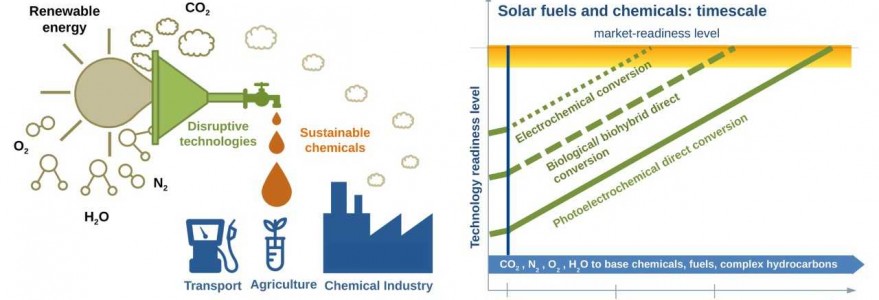“Solar energy for a circular economy”, a project of SUNRISE consortium, has been selected as one of the six Coordination and Support Actions (CSA) within the Horizon 2020 programme. It will set the basis for a European large scale research project. UW belongs to the consortium.
SUNRISE is multidisciplinary consortium of 20 partners from 13 European countries. It consists of universities (e.g. the University of Warsaw, Leiden University, University of Uppsala, Imperial College of London), research centres (e.g. French Alternative Energies and Atomic Energy Commission, Swiss Federal Laboratories for Materials Science and Technology), European associations companies (Siemens AG, Johnson Matthey and ENGIE). The University of Warsaw contribution is led by Prof. Joanna Kargul with support of Dr. Renata Solarska from the Centre of New Technologies.
The vision of SUNRISE is a radical and ambitious scientific and technological approach for solar energy conversion and storage to provide a sustainable alternative to fossil-based, energy-intensive production of fuels and base chemicals. This is fully aligned with the recently released European Commission long-term strategy for a climate neutral Europe by 2050.
Six CSA projects have been selected for the 2018 call “FETFLAG-01-2018” within one of the three main research areas proposed: Information and communication technology (ICT) and Connected Society; Health and Life Sciences; and Energy, Environment and Climate Change. These actions aim at preparing new European large scale research initiatives to be potentially supported in the next European research and innovation framework programme, Horizon Europe. The selected proposals are urged to set the basis for large visionary, science-driven, long-term research projects focused on addressing the major European societal challenges and turning scientific advances into concrete innovation opportunities, growth and jobs.
“Solar energy for a circular economy” project will last one year (starting in spring 2019). SUNRISE, as part of the Energy, Environment and Climate Change area, gathers players from academia, industry, policy-making and society to prepare a strategic long-term research roadmap and a consolidated vision of a future large research project. SUNRISE aims at providing a sustainable alternative to the fossil-based, energy-intensive production of fuels and chemicals, based on solar energy conversion and widely available feedstock (CO2, H2O, N2). A sustainable CO2 cycle, which leads to an atmospheric CO2 concentration decrease and stabilisation at a level compatible with climate stability, is the main target behind this approach, which also aims for a sustainable use of land and natural resources to implement a circular economy.
Information about the SUNRISE project also appeared in Nature in the article entitled “Europe’s next €1-billion science projects: six teams make it to final round”.



